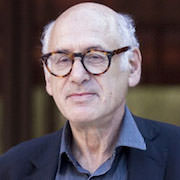Paavo Johannes Heininen (born 13 January 1938) is a Finnish composer and pianist. He was born in Helsinki, where he studied at the Sibelius Academy and was taught composition by Aarre Merikanto, Einojuhani Rautavaara, Einar Englund, and Joonas Kokkonen. He continued his studies in Cologne with Bernd Alois Zimmermann; at the Juilliard School of Music in New York with Vincent Persichetti and Eduard Steuermann; and privately in Poland with Witold Lutosławski. He has also studied musicology at the University of Helsinki.
Heininen is one of the most important Finnish modernist composers. His works can be roughly divided into two periods: dodecaphonic (c. 1957–1975) and serialist (from 1976 onwards). Due to the hostile reactions to his early works, particularly the First Symphony, his works up to the 1980s can be roughly divided in two groups: more personal and complex pieces and more approachable, audience-friendly pieces such as the Second Symphony, "Petite symphonie joyeuse".
As professor of composition at the Sibelius Academy, Heininen has been highly influential in educating the next generation of Finnish composers and his pupils have included Magnus Lindberg, Kaija Saariaho, Jukka Tiensuu, Jouni Kaipainen and Veli-Matti Puumala.
In addition to composing original works, Heininen has reconstructed several pieces that his composition teacher Aarre Merikanto mutilated or destroyed, including the latter's Symphonic Study (1928) and String Sextet (1932) and written the violin concerto Tuuminki (A Notion) as a "re-imagining" of Merikanto's completely destroyed third violin concerto. Alongside composition, Heininen has been active as a pianist, premiering and recording several of his own works. He is also known as an essayist and has written a large number of composer portraits.





